
It’s like death and taxes: inevitable. The bigger a company gets, the worse its content marketing becomes.
HubSpot teaching you how to type the shrug emoji or buy bitcoin stock. Salesforce sharing inspiring business quotes. GoDaddy helping you use Bing AI, or Zendesk sharing catchy sales slogans.
Judged by content marketing best practice, these articles are bad.
They won’t resonate with decision-makers. Nobody will buy a HubSpot license after Googling “how to buy bitcoin stock.” It’s the very definition of vanity traffic: tons of visits with no obvious impact on the business.
So why does this happen?
There’s an obvious (but flawed) answer to this question: big companies are inefficient.
As companies grow, they become more complicated, and writing good, relevant content becomes harder. I’ve experienced this firsthand:
- extra rounds of legal review and stakeholder approval creeping into processes.
- content watered down to serve an ever-more generic “brand voice”.
- growing misalignment between search and content teams.
- a lack of content leadership within the company as early employees leave.
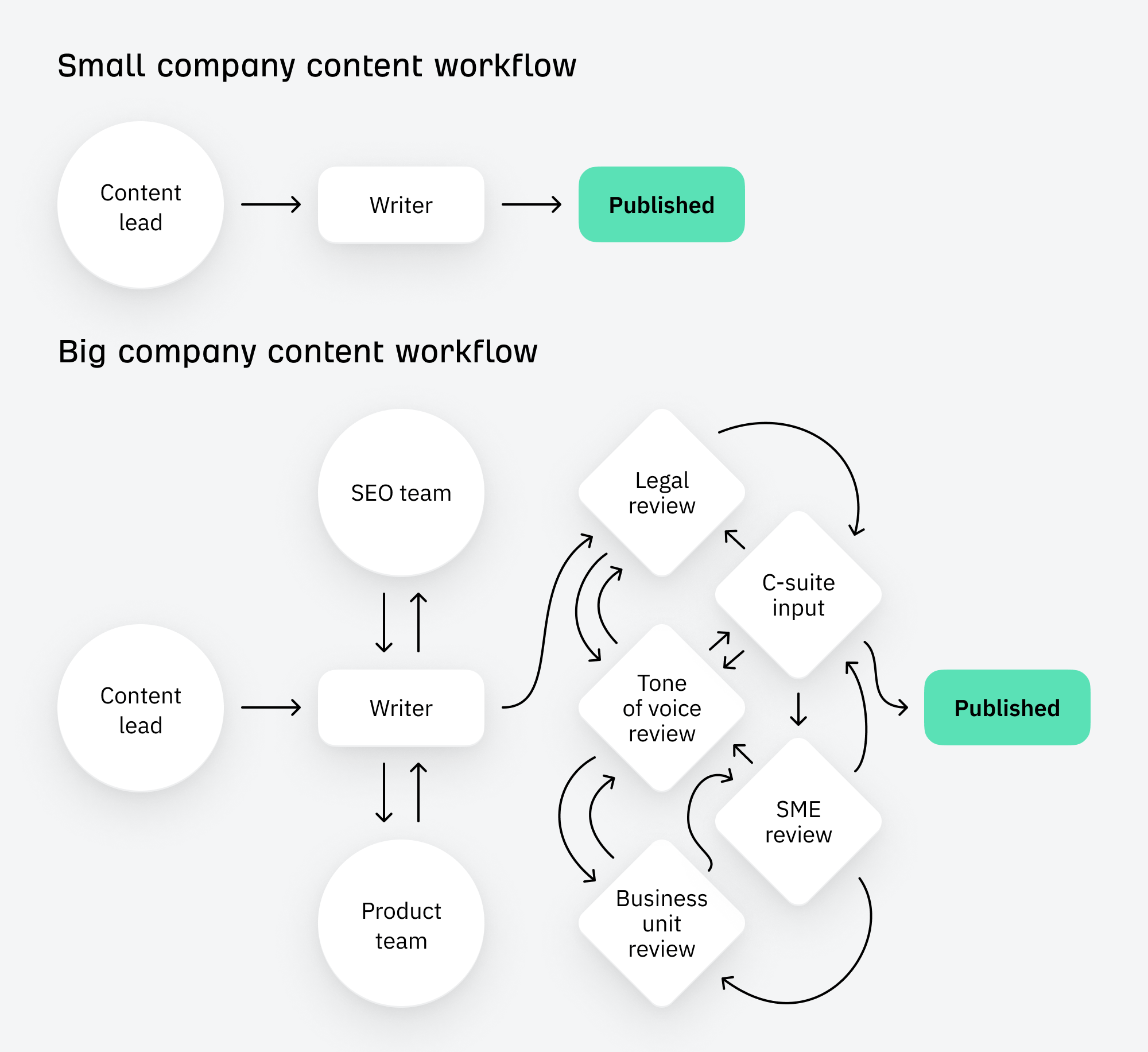
Similarly, funded companies have to grow, even when they’re already huge. Content has to feed the machine, continually increasing traffic… even if that traffic never contributes to the bottom line.
There’s an element of truth here, but I’ve come to think that both these arguments are naive, and certainly not the whole story.
It is wrong to assume that the same people that grew the company suddenly forgot everything they once knew about content, and wrong to assume that companies willfully target useless keywords just to game their OKRs.
Instead, let’s assume that this strategy is deliberate, and not oversight. I think bad content—and the vanity traffic it generates—is actually good for business.
There are benefits to driving tons of traffic, even if that traffic never directly converts. Or put in meme format:
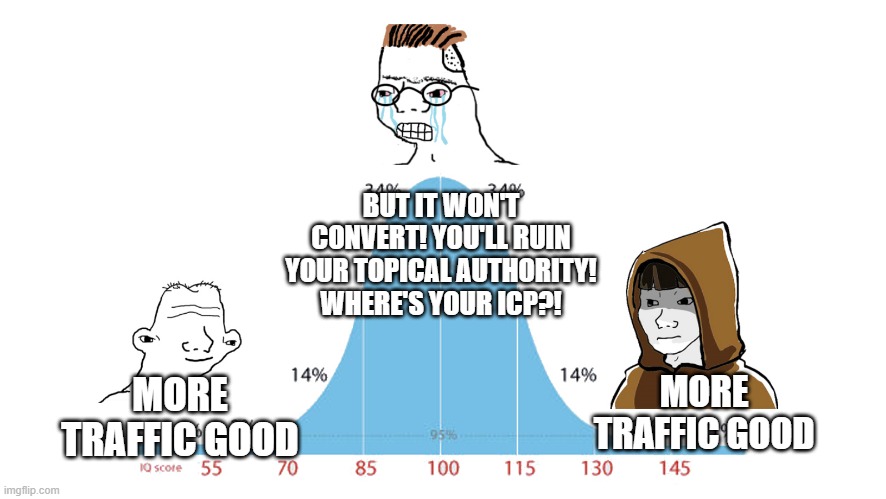
Programmatic SEO is a good example. Why does Dialpad create landing pages for local phone numbers?
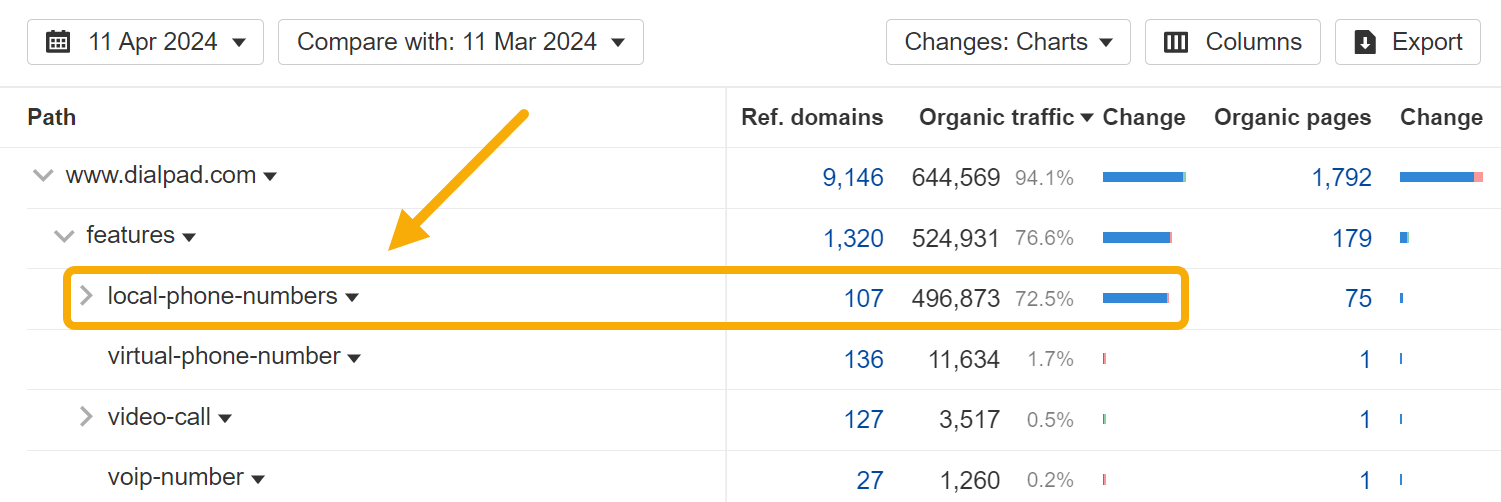
Why does Wise target exchange rate keywords?
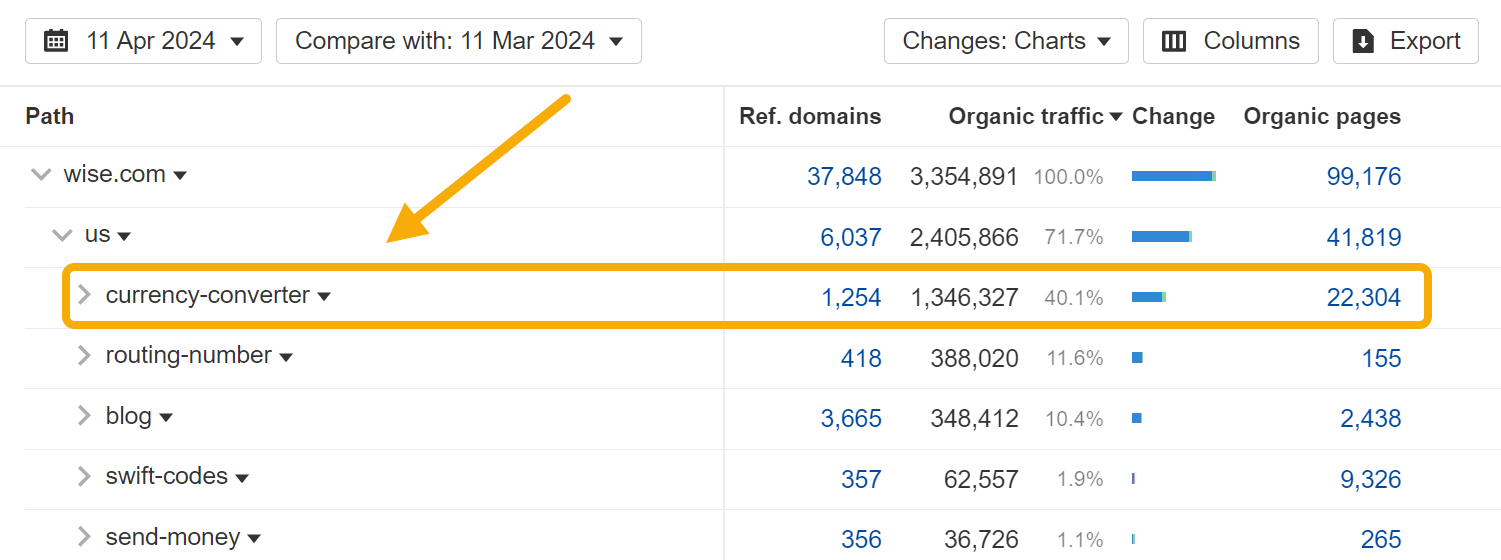
Why do we have a list of most popular websites pages?

As this Twitter user points out, these articles will never convert…
The conversion rate for this must be awful though. Like there is no purchase intent behind these searches, and it’s most likely all consumers who aren’t their target market and don’t then want to buy an ‘AI powered collaboration platform’. These are basically vanity visits…
— Aaron Beashel (@aaronbeashel) February 28, 2024
…but they don’t need to.
Every published URL and targeted keyword is a new doorway from the backwaters of the internet into your website. It’s a chance to acquire backlinks that wouldn’t otherwise exist, and an opportunity to get your brand in front of thousands of new, otherwise unfamiliar people.
These benefits might not directly translate into revenue, but over time, in aggregate, they can have a huge indirect impact on revenue. They can:
- Strengthen domain authority and the search performance of every other page on the website.
- Boost brand awareness, and encourage serendipitous interactions that land your brand in front of the right person at the right time.
- Deny your competitors traffic and dilute their share of voice.
These small benefits become more worthwhile when multiplied across many hundreds or thousands of pages. If you can minimize the cost of the content, there is relatively little downside.
What about topical authority?
“But what about topical authority?!” I hear you cry. “If you stray too far from your area of expertise, won’t rankings suffer for it?”
I reply simply with this screenshot of Forbes’ “health” subfolder, generating almost 4 million estimated monthly organic pageviews:
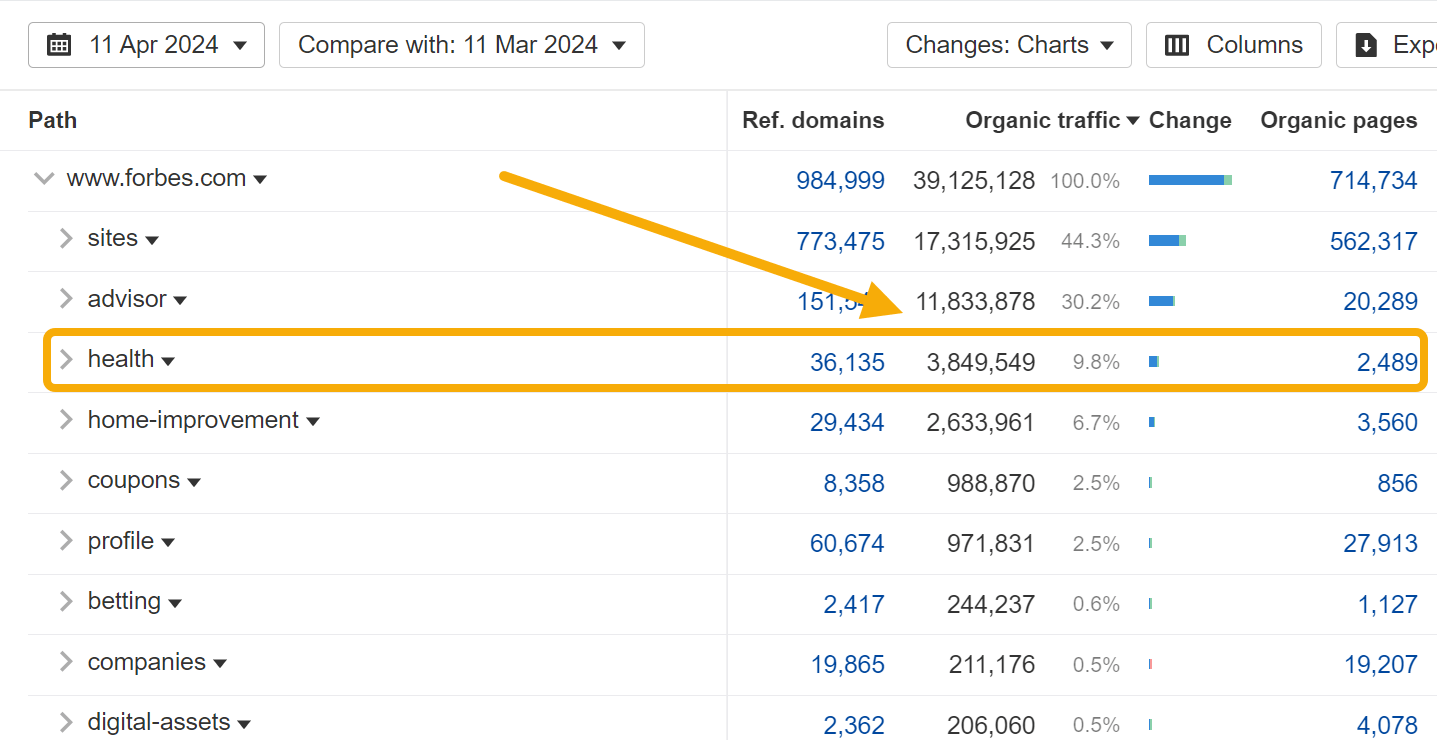
And big companies can minimize cost. For large, established brands, the marginal cost of content creation is relatively low.
Many companies scale their output through networks of freelancer writers, avoiding the cost of fully loaded employees. They have established, efficient processes for research, briefing, editorial review, publication and maintenance. The cost of an additional “unit” of content—or ten, or a hundred—is not that great, especially relative to other marketing channels.
There is also relatively little opportunity cost to consider: the fact that energy spent on “vanity” traffic could be better spent elsewhere, on more business-relevant topics.
In reality, many of the companies engaging in this strategy have already plucked the low-hanging fruit and written almost every product-relevant topic. There are a finite number of high traffic, high relevance topics; blog consistently for a decade and you too will reach these limits.
On top of that, the HubSpots and Salesforces of the world have very established, very efficient sales processes. Content gating, lead capture and scoring, and retargeting allow them to put very small conversion rates to relatively good use.
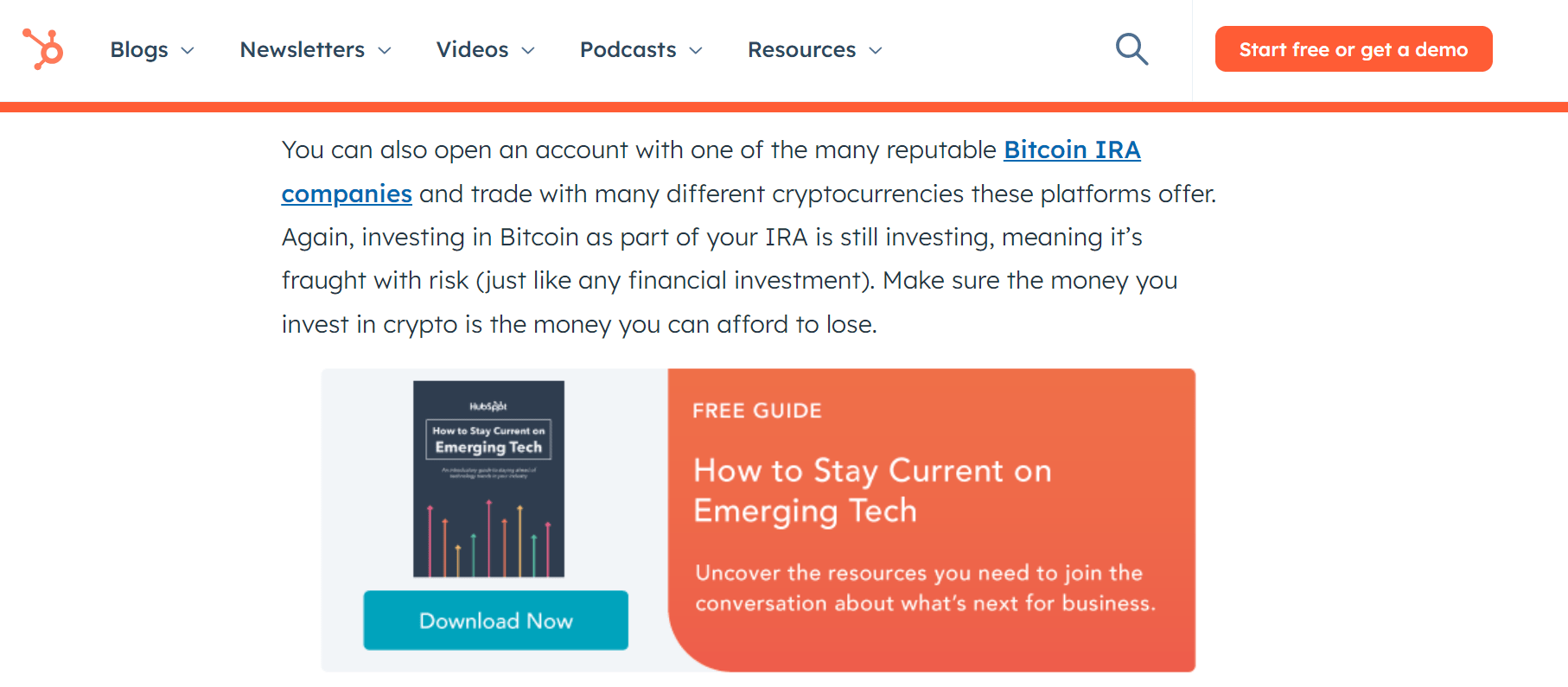
Even HubSpot’s article on Bitcoin stock has its own relevant call-to-action—and for HubSpot, building a database of aspiring investors is more valuable than it sounds, because…
The bigger a company grows, the bigger its audience needs to be to continue sustaining that growth rate.
Companies generally expand their total addressable market (TAM) as they grow, like HubSpot broadening from marketing to sales and customer success, launching new product lines for new—much bigger—audiences. This means the target audience for their content marketing grows alongside.
As Peep Laja put its:
When in early stages, you have to focus.
But as you grow in revenue and want to become an absolute monster of a company… they all seem to become for “everyone”. Salesforce, Hubspot, Zendesk, Freshworks, etc etc.
Any exceptions here? $1B+ B2B SaaS companies that are narrowly…
— Pe:p Laja (@peeplaja) April 4, 2024
But for the biggest companies, this principle is taken to an extreme. When a company gears up to IPO, its target audience expands to… pretty much everyone.
This was something Janessa Lantz (ex-HubSpot and dbt Labs) helped me understand: the target audience for a post-IPO company is not just end users, but institutional investors, market analysts, journalists, even regular Jane investors.
These are people who can influence the company’s worth in ways beyond simply buying a subscription: they can invest or encourage others to invest and dramatically influence the share price. These people are influenced by billboards, OOH advertising and, you guessed it, seemingly “bad” content showing up whenever they Google something.
You can think of this as a second, additional marketing funnel for post-IPO companies:
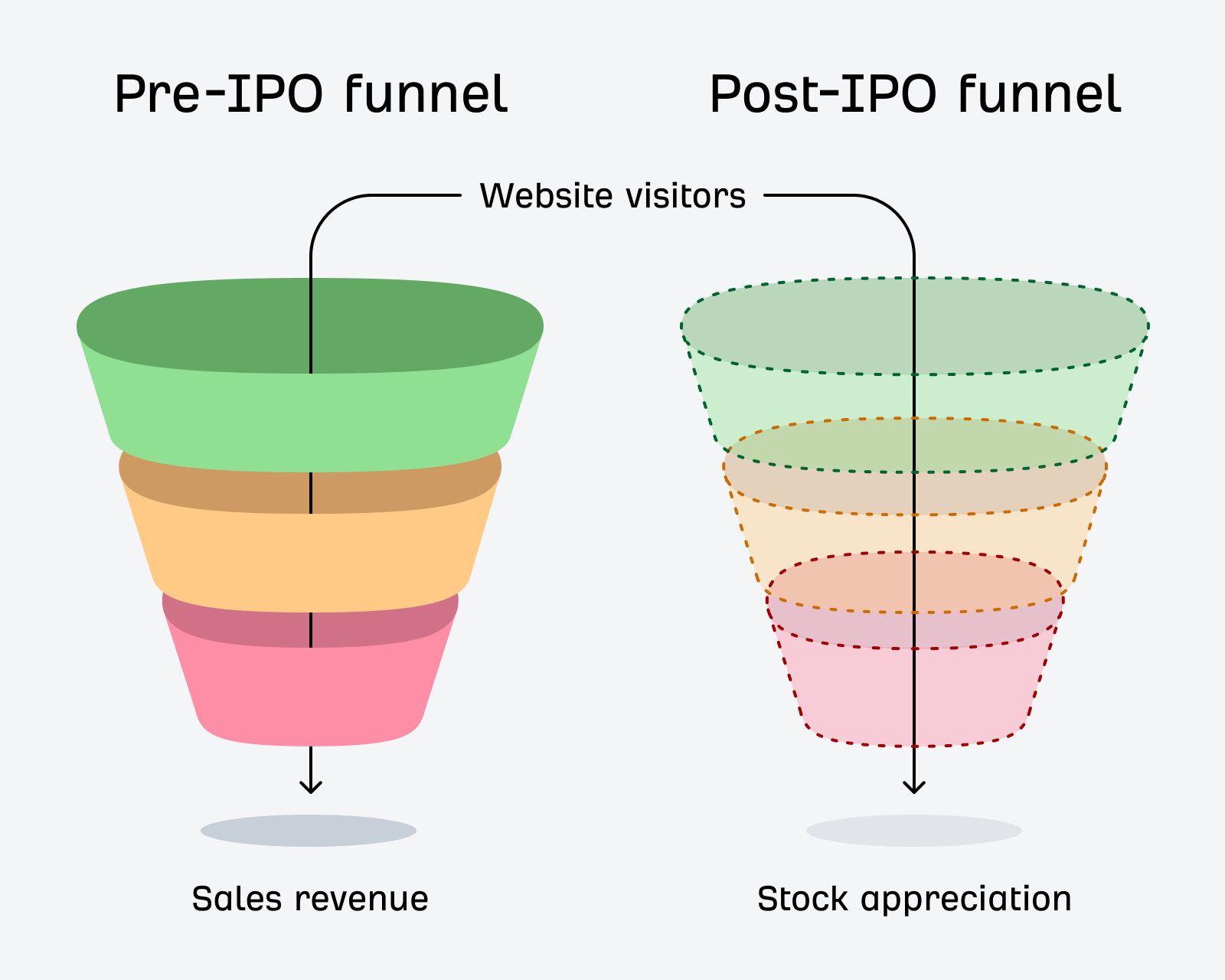
These visitors might not purchase a software subscription when they see your article in the SERP, but they will notice your brand, and maybe listen more attentively the next time your stock ticker appears on the news.
They won’t become power users, but they might download your eBook and add an extra unit to the email subscribers reported in your S1.
They might not contribute revenue now, but they will in the future: in the form of stock appreciation, or becoming the target audience for a future product line.
Vanity traffic does create value, but in a form most content marketers are not used to measuring.
If any of these benefits apply, then it makes sense to acquire them for your company—but also to deny them to your competitors.
SEO is an arms race: there are a finite number of keywords and topics, and leaving a rival to claim hundreds, even thousands of SERPs uncontested could very quickly create a headache for your company.
SEO can quickly create a moat of backlinks and brand awareness that can be virtually impossible to challenge; left unchecked, the gap between your company and your rival can accelerate at an accelerating pace.
Pumping out “bad” content and chasing vanity traffic is a chance to deny your rivals unchallenged share of voice, and make sure your brand always has a seat at the table.
Final thoughts
These types of articles are miscategorized—instead of thinking of them as bad content, it’s better to think of them as cheap digital billboards with surprisingly great attribution.
Big companies chasing “vanity traffic” isn’t an accident or oversight—there are good reasons to invest energy into content that will never convert. There is benefit, just not in the format most content marketers are used to.
This is not an argument to suggest that every company should invest in hyper-broad, high-traffic keywords. But if you’ve been blogging for a decade, or you’re gearing up for an IPO, then “bad content” and the vanity traffic it creates might not be so bad.
Content Copyrights Belong to The Author. All Rights Reserved.
We're A Dallas Digital Marketing Agency That is Experts At Social Media Marketing, Website Design and Emarketing and Promotion.


